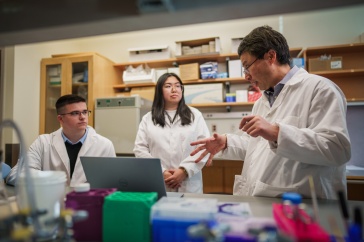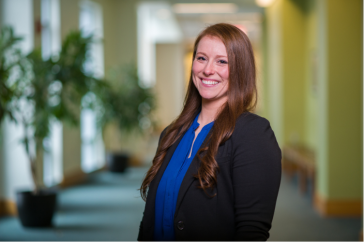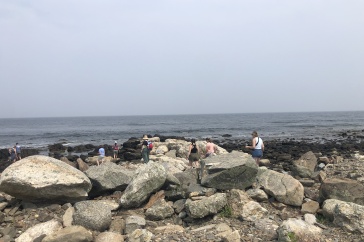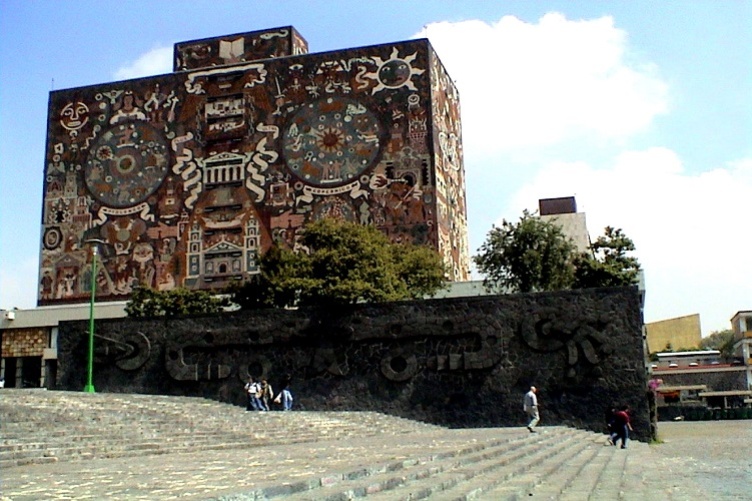
The Library of UNAM, Mexico by "hummanna" (built by Juan O'Gorman). This file is licensed under the Creative Commons Attribution 2.0 Generic license
From March 30 through April 1, dozens of scholars in the social sciences and humanities from around the continent met on the UNH campus and at The Browne Center for the 2023 Dunfey/Sidore Symposium, dedicated to discussions on critical and sometimes controversial issues facing our society. This year’s symposium, “The Ethics of Encounter: Research, Communities, and Repair,” explored ethical, collaborative and reparative aspects of social scientists’ research, focusing on restorative justice for communities that have been wronged by history. Both Indigenous and settler speakers led conversations centered around “a commitment to care — to caring for ourselves, each other, and our world,” as summarized by Julia Rodriguez, associate professor of history at UNH and one of the leading forces behind organizing the symposium, along with the UNH Center for the Humanities, Adam Warren (University of Washington), and Stephen Casper (Clarkson University).
Keynote speakers from across the continent shared research focused on crucial work in repair focused on Indigenous and BIPOC communities in the Americas:
Kisha Supernant, a Métis/Papaschase/British archaeologist, opened the symposium Thursday evening in the Strafford Room with her keynote, "Encountering Kin, Encountering Truth: Indigenous Archaeology as Restorative Justice,” which focused on tracking down missing Indigenous children in Canada who were forced from their homes into residential schools.
Kiara Vigil, a Dakota, Mexican, and white heritage associate professor of American studies at Amherst College, began Friday morning with a discussion of her work alongside Dakota language experts and teachers to provide new translations of rare Dakota-only texts.
Eden Medina, an associate professor of science, technology, and society at MIT, anchored for the keynote speakers with her Saturday presentation on her forensic research into cases of political disappearance in Chile during Pinochet.
Each speaker’s presentation was supported by a strong foundation of research, an understanding of data, and expertise, but the greatest takeaway was their emotional honesty.
“This is a place where people walk their dogs and they’re potentially walking over the graves of my ancestors,” said Supernant, describing her work in Alberta as “heart-centered archaeology,” a concept that strays from the traditional, objective, often “cold” method of scientific research, and instead implements the “four chambers: care, emotion, rigor, and relation.”
“In order to be in the world, we must care for our relations,” Supernant said in her keynote address. The idea of relations, known as “Wahkotowin” in some Indigenous communities, was a major theme throughout the weekend. The UNH Civil Discourse Lab led teaching circles on ethics and empathy in the classroom, encouraging professors and their students to lay the ground rules for hard conversations and differing viewpoints, creating safe learning environments. Araceli Hernández-Laroche, a professor of modern languages at the University of South Carolina, classified her “intellectual DNA” as “bridg[ing] communities through language” and encouraged teachers to incorporate students into their research. Sandra Kaddy, the president of the Seacoast African American Cultural Center (SAACC), said her goal in her work is to “pass the baton” to the younger generations by getting them excited about activism.
Presenters on four roundtables over the two-day gathering at the Browne Center also spoke on the importance of the relationships formed not just within Indigenous communities and settler communities independently but also between the two.
Denise Pouliot, the Sag8moskwa (head female speaker) of the Cowasuck Band of the Pennacook-Abenaki People, spoke on the importance of moving “beyond the Land Acknowledgement,” a practice that institutions across the nation, including UNH, have adopted as a way of honoring the Indigenous lands and communities they occupy. Denise and Paul Pouliot, the Sag8mo (head male speaker/grand chief) of the Cowasuck Band of the Pennacook-Abenaki People, gave such an acknowledgement to begin each day of the symposium, performing an Indigenous song that honored “land, ancestor, and Creator.” But when do institutions move beyond the Land Acknowledgement and start making institutional commitments to repairing Indigenous communities?
“We need to stop having these conversations and take action,” said Denise Pouliot. “Institutions want to do better, and we want to help them do better, but they need to take responsibility and initiative to actually do better." Pouliot’s words echoed Supernant’s earlier reflection on the symposium subtitle, “Research, Communities, and Repair,” and asked why Indigenous communities need repair. Her answer: “Because we’ve been harmed.”
One of many examples of harm done to Indigenous communities was brought up during the symposium by Vigil, who shared that, “Dakota people were systemically dispossessed of our homeland, and we currently reside on about 0.01% of our original land base within the borders of what is now the state of Minnesota." Unfortunately, the Dakota people’s story is not a unique one among Indigenous communities, as was evident from speakers over the weekend. While recognition of history and giving platforms to Indigenous voices are the first steps to restorative justice, they are not the sole solutions.
Rebecca Pelky, a member of the Brothertown Indian Nation of Wisconsin and a native of Michigan’s Upper Peninsula, proposed that “ethics comes down to responsibility.” She asked the audience to ask themselves, “What are my responsibilities to the communities I’m a part of?”
On the final day of the symposium, Denise and Paul Pouliot sat in the center of a circle of attendees and discussed how people who are not Indigenous can support Indigenous communities. They encouraged educators, scholars, workers and anyone else with access to those who make legal decisions — board members, government officials, etc. — to include Indigenous voices in their decision-making.
“We’ve inherited this history and these laws,” said Denise Pouliot. “It’s not about pointing fingers — that won’t fix anything ... it’s not about uplifting Indigenous presence. It’s about the foundation of this nation. It’s about humanity.”
The Dunfey Endowment for the Study of History was established in 1994 from a generous gift of the estate of William L. Dunfey; the endowment supports conferences and lecture series on major topics of national and international significance of interest to the UNH History Department faculty, students, and the public.
The Saul O Sidore Memorial Lecture Series was established in 1965 in memory of Saul O Sidore of Manchester, New Hampshire. The purpose of the series is to offer the university community and the state of New Hampshire programs that raise critical and sometimes controversial issues facing our society. The University of New Hampshire Center for the Humanities sponsors the programs. Lectures are free and open to the public.

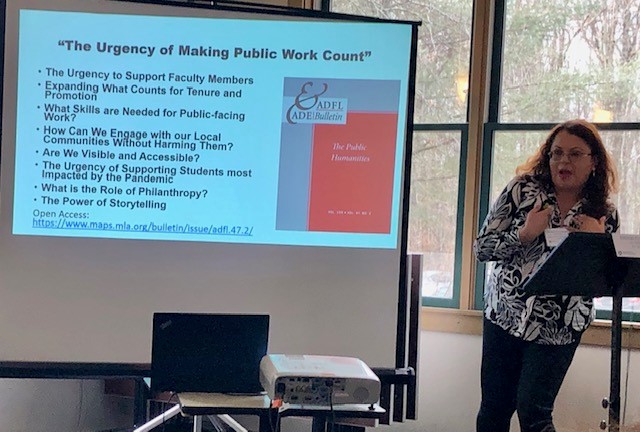
-
Written By:
Lily Pudlo | UNH Center for the Humanities | lilian.pudlo@unh.edu














































